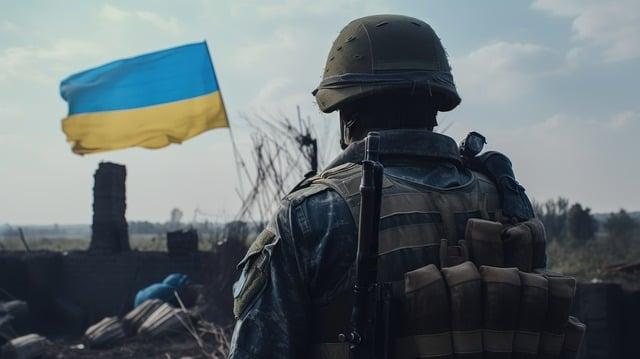In teh shadow of a conflict that has reshaped Europe and reverberated globally, the ongoing war between Ukraine and Russia has reached a pivotal juncture, prompting urgent calls for negotiation and resolution. As both nations stand at a critical crossroads, the stakes could not be higher, with each party seeking to redefine their future amid a landscape of shattered trust and geopolitical complexity. This article delves into the intricate motives behind the diplomatic maneuvers, unraveling what Ukraine and Russia aim to achieve in these essential discussions. By examining the perspectives, aspirations, and underlying interests of each side, we strive to illuminate the pathways toward peace, the challenges that lie ahead, and the profound implications for the region and beyond.
Understanding the Geopolitical Stakes Behind the Ukraine-Russia Negotiations

The ongoing negotiations between Ukraine and Russia are charged with geopolitical meaning that stretches well beyond their immediate borders. For Ukraine, the stakes are clear: a restoration of its territorial integrity, the affirmation of its sovereignty, and an assurance of long-term security from future aggression. The emphasis is on achieving international guarantees that might include NATO membership aspirations and Eastern European partnerships.The potential of economic recovery post-conflict is also a driving force, as ukraine seeks to position itself as a resilient European state that can attract foreign investment and support. Key objectives for Ukraine include:
- Return of occupied territories: Ensuring Crimea and parts of Donetsk and Luhansk are reintegrated.
- International security assurances: Seeking binding agreements that deter future aggression.
- Strengthening alliances: Fostering closer ties with the EU and NATO.
On the flip side, Russia’s objectives are intricately tied to maintaining its sphere of influence in Eastern Europe while showcasing military prowess. The Kremlin aims to negotiate a settlement that recognizes its annexation of Crimea and legitimizes the separatist regions in Donetsk and Luhansk. Economic sanctions relief is also high on Russia’s agenda,as the country grapples with the repercussions of global financial isolation. In this context, the following goals emerge for Russia:
- Recognition of territorial gains: Securing formal acknowledgment of its claims on Ukrainian territories.
- Sanctions mitigation: A path to soften sanctions to rejuvenate its economy.
- Geopolitical leverage: Reinforcing its influence over former Soviet states.
Key Motivations for Ukraine and Russia in the Quest for Peace

Both Ukraine and Russia have distinctly articulated motivations shaping their approach to peace negotiations, reflecting their respective national interests and geopolitical aspirations. For Ukraine, securing territorial integrity is paramount.The restoration of sovereignty over Crimea and the eastern regions remains a fundamental goal, as these territories hold significant symbolic and strategic importance. Additionally, Ukraine seeks reassurance against future aggression through international alliances and potential memberships in organizations like NATO and the EU, which would bolster its defense commitments and economic support.
Conversely, Russia’s motivations are intricately woven around maintaining geopolitical influence in the region and asserting its national narrative. Moscow’s interest in a buffer zone against NATO expansion drives its demands for autonomy in eastern Ukraine and concessions that could prevent Ukraine from fully aligning with the west. Furthermore, russia aims for recognition of its annexations and wishes to secure economic benefits through trade agreements and energy partnerships. understanding these contrasting goals is crucial for fostering a extensive dialog aimed at a lasting resolution.
the Role of International Mediation in Shaping a Sustainable resolution

international mediation serves as a crucial mechanism in the ongoing negotiations between Ukraine and Russia, aiming to address not only the immediate cessation of hostilities but also to lay the groundwork for a lasting peace. Mediators,often representing various international bodies or nations,work to facilitate dialogue by bridging ideological divides and enhancing mutual understanding. Such mediators are tasked with identifying the core interests of each party to craft solutions that address key concerns, such as territorial integrity, security guarantees, and humanitarian needs, fostering an environment conducive to compromise.
Key objectives sought by involved parties often include:
- Security Assurances: Both nations seek reassurances that their sovereignty and territorial claims will be respected.
- economic Stability: Focus on economic recovery and the lifting of sanctions, essential for rebuilding war-torn regions.
- Humanitarian Solutions: Addressing the dire humanitarian needs of civilians affected by the conflict.
Given the complexity of the situation, mediators often utilize structured approaches, such as parallel negotiations or phased agreements, to ensure that both parties feel heard and validated. By establishing a framework that prioritizes dialogue over belligerence, international mediation not only aims to resolve current disputes but also endeavors to instill a culture of peaceful conflict resolution that could benefit future generations.
Strategic Recommendations for Facilitating productive Dialogue and Compromise

Effective interaction is pivotal in negotiations, particularly in complex geopolitical situations such as the ongoing conflict between ukraine and Russia. Diplomatic channels must prioritize active listening and empathy to comprehend each party’s motives and fears. Implementing structured discussions can lead to more productive exchanges, including:
- Establishing common ground by identifying mutual interests.
- Encouraging clarity to build trust and reduce misunderstandings.
- Utilizing mediators who can provide a neutral outlook and facilitate dialogue.
Moreover, the formulation of clear goals and compromise options is critical.It is essential to explore various avenues for resolution while considering the potential impacts on each party. A feasible framework might include:
| Party | Objectives | Possible Compromises |
|---|---|---|
| Ukraine | Territorial integrity, security guarantees | Autonomy for certain regions, international peacekeepers |
| Russia | Recognition of influence, security concerns | Withdrawal of troops, economic incentives |
To Wrap It Up
the intricate dance of diplomacy surrounding the Ukraine-Russia war reveals not only the aspirations of nations but also the profound complexities of conflict resolution. As each player enters the negotiations with their own agendas, fears, and hopes, the path to peace remains fraught with challenges. Understanding the multifaceted objectives at stake is essential, not just for those directly involved but for the global community as well. As we witness this pivotal moment in history, the world watches closely, yearning for a resolution that could reshape the landscape of international relations for years to come. The outcome of these negotiations could influence not just the immediate region, but the future of global peace and security. Whether a beacon of hope or a lesson in caution, the unfolding story of Ukraine and Russia remains a testament to the enduring quest for understanding and resolution in the face of deep-seated strife. As we look ahead, the call for dialogue and compromise resounds louder than ever.







